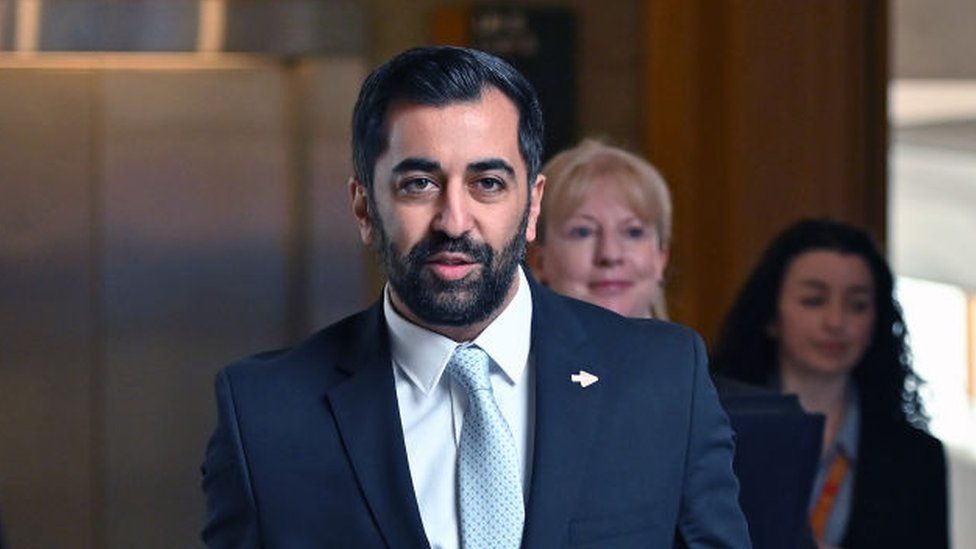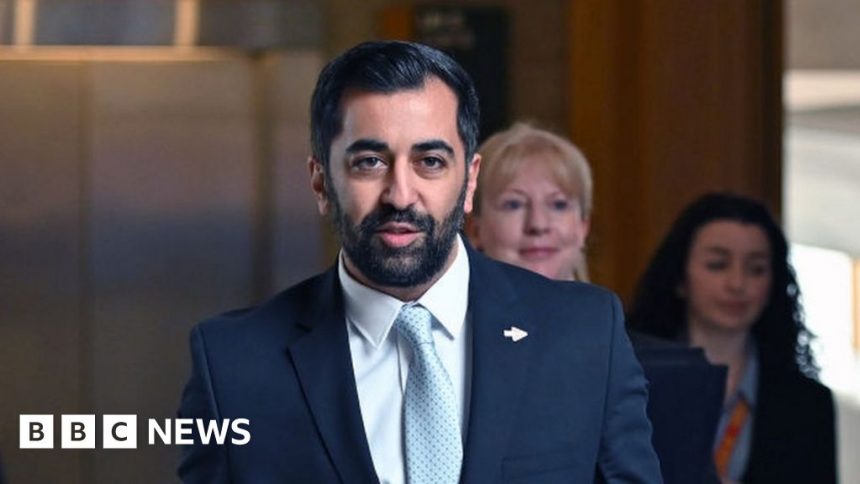Can Humza Yousaf survive as Scotland’s first minister?
-
Published

Humza Yousaf has been in office for barely a year but his future as first minister is already hanging in the balance.
His handling of a deal with the Scottish Green Party, which he inherited from his predecessor Nicola Sturgeon, is the source of much of his trouble.
The pact, known as the Bute House Agreement, was born in the first minister’s official residence in Edinburgh in 2021 amidst promises of a new politics of co-operation and collaboration.
On a bright, cold Thursday in April, it ended where it began when Mr Yousaf summoned his two Green ministers to an early morning meeting in Bute House.
Voices were not actually raised but, I was told by someone in the room, the discussion was “pretty robust.”
Minutes later, Lorna Slater and Patrick Harvie emerged, scowling in the sunshine.
They headed to the Scottish Parliament and promptly laid into Mr Yousaf in harsh and personal terms, accusing him of betrayal, cowardice, and weakness.
Meanwhile, back inside the grand Edinburgh townhouse, the SNP leader was facing the media – and the music – in front of a gilt-edged mirror.
Mr Yousaf smiled as he batted away questions about the Greens’ onslaught.
“This is leadership,” he told us, adding: “This is the ability to say we are taking control as a party and indeed as a government.”
The SNP leader appeared buoyant. So did his team. There was a feeling that, in ditching their partners, Team Yousaf had lightened the load.
Not so fast.
By teatime, faces among some senior Scottish government figures were glum as it became clear that the Greens were going to respond not just with words but with deeds.
Mr Harvie and Ms Slater confirmed that they would vote against Mr Yousaf in a confidence motion at Holyrood, accusing him of caving in to right-wing elements in the SNP.
The Scottish Greens were particularly annoyed about the heat they took when the Scottish government decided to abandon a target to reduce by 75% emissions of planet-warming gases by 2030.
But they were also angry about the shifting sands of social policy.
Together those issues had prompted the leadership to seek a vote of members on the Bute House Agreement in around four weeks’ time.
Responding to Mr Yousaf’s decision to ditch them before they had a chance to ditch him, both Ms Slater and Mr Harvie repeatedly referred to the “progressive agenda” which they claimed the first minister had abandoned.
“If you look at some of the policies that the SNP’s right-wing like to criticise us for, they were in the SNP’s own manifesto,” said Mr Harvie.
Among those policies, he added, was “transgender people’s rights.”
And that most contentious of issues may yet determine Mr Yousaf’s political fate.
For the person who is likely to hold the casting vote when MSPs vote on his future is none other than his former SNP leadership rival, Ash Regan, who resigned as a minister in Ms Sturgeon’s government in protest at attempts to make it easier to legally change gender.
Ms Regan, who is now a member of Alex Salmond’s Alba Party, was sipping lemonade at the parliamentary bar as the drama unfolded, smiling from ear to ear.
She had not yet, she insisted when I asked her, made up her mind about how to vote.
When she defected to Alba last October, Mr Yousaf said she was “not a particularly great loss,” a quote he may yet come to regret.
But what price will Ms Regan want to extract for her support?
A clue might be found in an interaction on social media on Thursday night with the writer JK Rowling.
Both women have campaigned against the SNP’s gender policies.
On X, Ms Regan thanked the author for her “incredible strength and support.”
“Thanks for standing firm for girls and women in Scotland, Ash,” the Harry Potter author replied.
Speaking to BBC Radio 4, Ms Regan confirmed that she had written to the first minister to ask about “how he will defend the rights of women and children,” as well as seeking detail about how Mr Yousaf planned to advance the cause of independence and make “a return to competent government.”
One Alba Party source told me that they wanted to see the full implementation in Scotland of the recommendations of the Cass Review of English gender healthcare.
“My vote will depend on really what Humza comes up with in response to my letter,” she added.
Ms Regan, said the Alba Party leader Alex Salmond, was now the most powerful politician in the Scottish Parliament.






